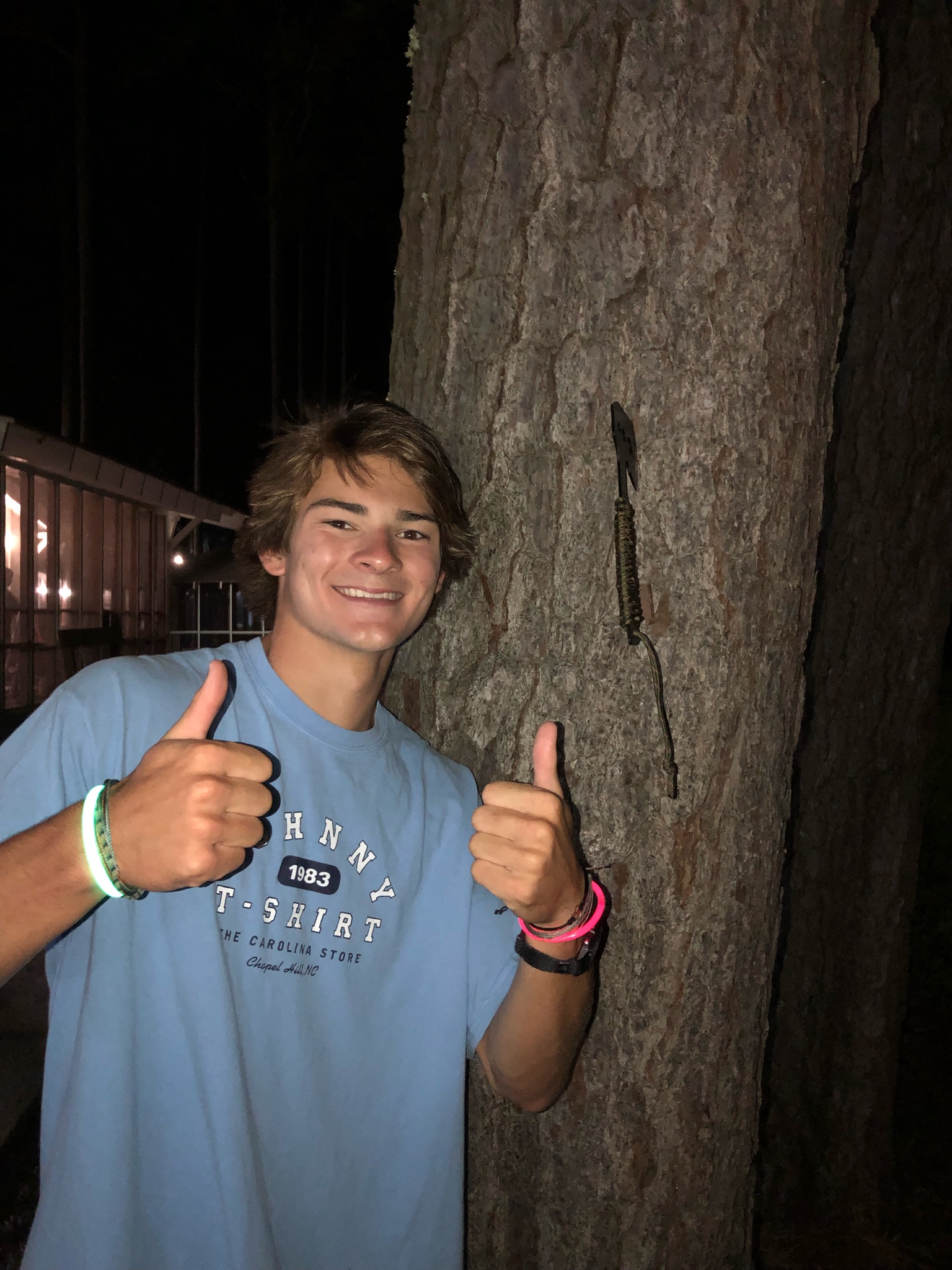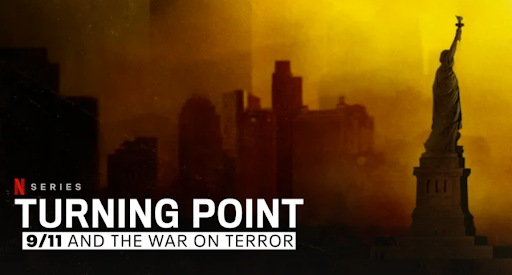Turning Point: 9/11 & the War on Terror, released to Netflix on September 1, 2021, is a powerful and heartfelt documentary series directed by Brian Knappenberger. The series focuses on the chronological timeline, causes, and effects of the 9/11 terrorist attacks and the untold aspects of the war on terrrorism throughout the twenty-first century.
Quick History
The Netflix Original docu series is based on the true events of the 9/11 attack and the United State’s military response afterward.
On September 11, 2001, members of the militant Islamist terrorist group Al-Qaeda, executed four coordinated attacks on the United States. Four passenger planes were seized by Al-Qaeda hijackers; American Airlines Flight 11, United Airlines Flight 175, American Airlines Flight 73, and United Airlines Flight 93. Three of the four hijacked planes were flown into the World Trade Center towers (WTC) in Manhattan, New York and the Pentagon in Washington D.C. Ultimately killing 2977 combined Americans in the attacks. The fourth hijacked plane, United Airlines 93, crashed outside of Pennsylvania, killing everyone on board (37).
After the 9/11 attacks, emotions and anger stirred within the United States as people seeked justice for those responsible. Rallying behind the emotions, President George Bush and his White House administration organized a full scale military response to fight terrorism in the Middle East. Throughout Bush’s and Obama’s presidency, fighting terrorism in the Middle East became less progressive and more difficult as years passed.
The United State’s forces encountered challenges with terrain, moral laws of war, and other problems which slowed progression of the war.
Nearly twenty years later, the occupation of Middle Eastern countries and war against terror is still a concern today.
Series Breakdown
The first episode focuses on the events leading up to 9/11 attacks, and its horrors as they unfolded. Knappenberger opens with the chronological timeline of the attacks on the World Trade Center. The episode includes real archival footage, newscast recordings, and photographs of the attacks to exploit the raw emotions and horror of 9/11 to the viewer. Interviews with firefighters, civilians, and other eyewitnesses provide deeper insight and new perspective of those impacted by the World Trade Center attacks.
The episode then shifts its focus to the faults in US intelligence at the time, and how the attacks on 9/11 can be traced back into the 1980’s. Major faults in intelligence organizations and National Security include poor identification and information on suspected terrorists, weak homeland security, and the disregardment of former terrorist attacks/plots in the United States.
Knappenberger’s title of the first episode, The System Was Blinking Red, refers to the faults in US intelligence and security bureaus which if given attention to ahead of time, could have potentially prevented the 9/11 attacks.
Episodes two and three center around the effects and aftermath.
Knappenberger concludes the events of the attacks in episode two with further interviews with survivors and eyewitnesses as they recount the tragic events endured on 9/11. More photographs and video recordings show the viewer the dustructive aftermath of each attack. Images of black smoke pouring out of the Pentagon, the engraved crater in Pennsylvania, and the desolated WTC towers at Ground Zero give a more extensive understanding of the impact 9/11 had on the world.
Following the attacks and rallied emotions in the United States, President Bush charts an aggressive military response to fight against terrorism by invading Afghanistan.
Episode three draws attention to the ways the United States government handled this military response in which Knappenberger exposes the flaws and insufficiency of Bush’s plan to counter terrorism.
In episode three, interviews with various former officials from the US Foreign Relations Department, CIA, FBI, and Homeland Security provide the viewer with never before seen insight on the war. Respondents from the interviews expose the unjust truths and flaws of Bush’s military response, providing declassified files and other formerly restricted information.
Knappenberger and interview respondents mention the flawed aspect of prisoners at the US military base in Guantanamo Bay, Cuba, in which the United States acted against the terms of the Geneva Conventions and violently interrogated and tortured suspected terrorist prisoners.
Other faults mentioned include the extensive waste of resources and money, obstacles of terrain (mountains/desert), and the social and language barrier between US forces and natives of Middle Eastern countries. The United States slowly increases surveillance and security as Islamophobia grows within the United States.
Concluding the series, episodes four and five specifically focus on the lack of strategy to win the war, ultimately leading to military disillusionment and further resurgence of terrorism in the Middle East.
Under the jurisdiction of President Barack Obama, and nearly two decades later, the ongoing war against terror fades from news headlines and mainstream media. The lack of military strategy and failing relations in Afghanistan make the war difficult and less progressive each day. US Army General, Dan McNeil, and US NATO Commander General, David Richards, both claim to have used various tactics to win firefights but had no presiding strategy to make further progress.
Due to the lack of strategy and attention, Obama decides to begin withdrawing US forces from the Middle East, but not without one more stop. The Obama administration and foreign intelligence agencies located and infiltrated a compound of interest in Pakistan which harbored the Al-Qaeda leader and 9/11 attacks orchestrater, Osama Bin Laden. Bin Laden, who had fled to Pakistan for refuge, was killed by US Navy Seals. Bin Laden’s death and the withdrawal of US forces symbolized what was thought to be the end of the war on terror. However, the resurgence of Al-Qaeda and Taliban Regime resulted from the extraction of US forces that threatened to plunge the Middle East back into bloodshed and war.
Today, the withdrawal of US forces from Afghanistan continues to be a political and military matter.
Review
Turning Point: 9/11 & the War On Terror is an incredible series that educates the viewer on deeper insight and impact of the September 11 attacks.
Currently, the series sits in Netflix’s top ten carousel of films, for Knappenberger’s series is a must watch. The recent passing of the twentieth anniversary of the attacks, the series is considered timely and a great way to educate oneself and learn more about the historic events of the attacks and its dwelling aftermath that continues today.
The generations born after 9/11, including myself, never truly understood the entire impact 9/11 had upon the United States and the world. Nearly all of the generations of Americans born after 9/11 have always lived in a society of immense homeland and national security.
Turning Point is a strong and entertaining way to learn about how these securities become prominent within our society today.
Knappenberger embeds a great deal of images and real footage of the 9/11 attacks and the Afghan war to accompany the information within each episode.
Interviews with survivors, first responders, and military personnel who were eyewitnesses to the attacks and later war give first hand information from real people who encountered the effects of 9/11. These interviews, photographs, and footage within each episode adds various points of view from different perspectives of the attacks, creating empathetic connections with the viewer.
Turning Point is a compelling and enlightening documentary series which sheds light on a dark period in US history, but also labels the legacy and impact of its response. I recommend anyone who is interested in the deeper context and history of the 9/11 terrorist attacks and war on terror to watch Knappenberger’s groundbreaking series.

Hi! My name is Chase and I am a staff writer for The Mycenaean. Two fun facts about me are that I enjoy playing guitar with my dad and friends, and I also am a two-time spikeball tournament champion.

Leave a Reply